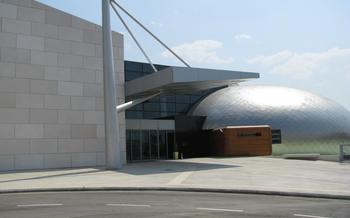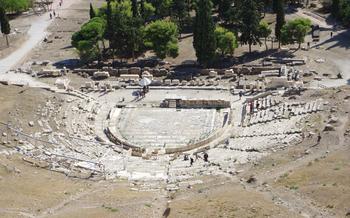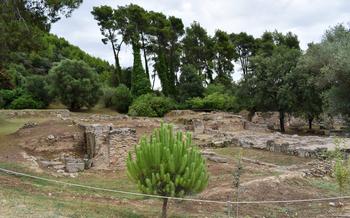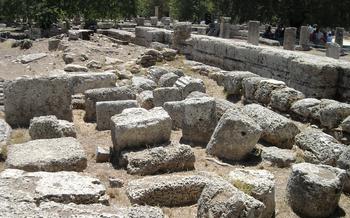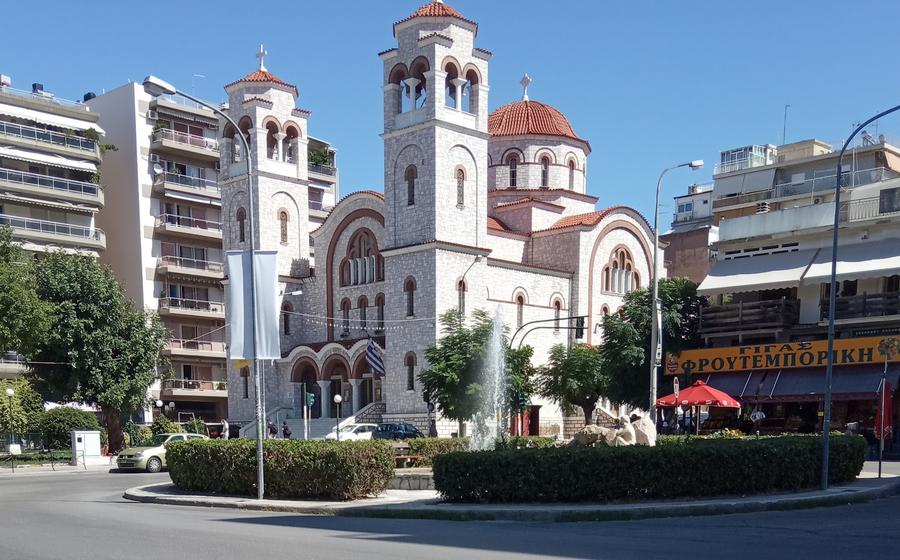
The Apollon Theatre Museum
- The Apollon Theatre Museum: An Ode to Performing Arts
- Unveiling the History of the Apollon Theatre
- Exploring the Architecture and Design
- Inside the Apollon Theatre Museum
- A Journey Through Greek Performing Arts
- Attending Performances at the Apollon Theatre
- Exhibitions and Events at the Museum
- Educational Programs for All Ages
- Accessibility and Facilities
- Location and Transportation
- Hours of Operation and Admission Fees
- Dining and Accommodation Nearby
- Tips for Planning Your Visit
- Capturing the Essence of Greek Culture
- Insider Tip: Unveiling Hidden Treasures
The Apollon Theatre Museum: An Ode to Performing Arts
The Apollon Theatre Museum is a cultural gem nestled in the heart of Patras, Greece. This grand institution stands as a testament to the city's rich artistic heritage and its enduring passion for the performing arts. Originally constructed in the late 19th century, the Apollon Theatre has played a pivotal role in shaping the cultural landscape of Patras, hosting countless performances, concerts, and theatrical productions that have captivated audiences for generations. In 2012, the theatre underwent a meticulous restoration and was transformed into a museum dedicated to preserving and showcasing the legacy of Greek performing arts. Today, the Apollon Theatre Museum invites visitors to embark on a captivating journey through the world of Greek culture, offering a glimpse into the history, traditions, and artistry that have shaped this vibrant Mediterranean nation.
Unveiling the History of the Apollon Theatre
The Apollon Theatre, a majestic edifice with a rich past, has stood as a beacon of performing arts in Patras since its inception in 187Initially conceived as a modest wooden structure, it underwent several transformations over the years, culminating in the construction of the grand neoclassical building that stands today.
The theatre's early days were marked by vibrant performances and events that captivated the hearts of Patras' residents. Renowned Greek and international artists graced its stage, showcasing a diverse repertoire of plays, concerts, and operas. The Apollon Theatre quickly became a cultural hub, attracting patrons from all walks of life who sought refuge in the magic of live performances.
As time went on, the theatre fell into disrepair, its grandeur fading away. However, in the 1980s, a wave of restoration efforts swept through the city, breathing new life into the Apollon Theatre. With meticulous care, the building's original splendor was meticulously restored, preserving its architectural integrity while adapting it to modern standards of safety and comfort.
This remarkable transformation culminated in the theatre's rebirth as the Apollon Theatre Museum, a testament to the enduring legacy of performing arts in Patras. Today, the museum stands as a living tribute to the city's rich cultural heritage, inviting visitors to explore the fascinating world of Greek theatre and its captivating stories.
Exploring the Architecture and Design
The Apollon Theatre, an architectural marvel, showcases a harmonious blend of Neoclassical and Art Nouveau styles. Its elegant facade, adorned with intricate carvings and statues, invites visitors to step into a world of grandeur and artistry. The theatre's interior is equally impressive, boasting a horseshoe-shaped auditorium with three tiers of balconies. The plush red velvet seats and ornate gold detailing create an atmosphere of opulence and exclusivity.
The stage, framed by a grand proscenium arch, is a testament to the theatre's rich history of performances. Behind the scenes, a labyrinth of corridors, dressing rooms, and workshops reveals the intricate workings of a theatre production. These spaces, once bustling with actors, stagehands, and designers, now serve as a glimpse into the behind-the-scenes magic that brings performances to life.
Inside the Apollon Theatre Museum
The Apollon Theatre Museum boasts a treasure trove of artifacts and memorabilia that transport visitors back in time to the golden age of Greek theatre. Among the highlights are:
-
Costumes and Props: Marvel at an array of elaborate costumes worn by actors in past performances, showcasing the evolution of fashion and style in Greek theatre. Admire intricate props that bring plays to life, from swords and scepters to masks and headdresses.
-
Playbills and Programs: Peruse a collection of playbills and programs from various productions staged at the Apollon Theatre throughout its history. These programs offer insights into the repertoire of the theatre, featuring cast lists, synopses, and reviews.
-
Interactive Displays: Engage with interactive displays that provide a deeper understanding of Greek theatre and its impact on society. Learn about the lives of renowned playwrights, explore the history of set design, and immerse yourself in the world of ancient Greek drama.
A Journey Through Greek Performing Arts
The Apollon Theatre Museum offers a comprehensive exploration of the rich history and evolution of Greek performing arts. Through its exhibits and displays, visitors can delve into the ancient origins of Greek theatre, tracing its roots back to the religious rituals and festivals of the ancient Greeks. The museum showcases the significant contributions of renowned Greek playwrights such as Aeschylus, Sophocles, Euripides, and Aristophanes, whose works continue to be performed and studied worldwide.
It also highlights the development of modern Greek theatre, shedding light on prominent playwrights and actors who have shaped the contemporary theatre scene. The museum celebrates the diversity of Greek performance styles, from traditional folk theatre to contemporary avant-garde productions. Through interactive displays and multimedia presentations, visitors can experience the vibrant energy and creativity that define Greek theatre.
Moreover, the museum explores the international collaborations and exchanges that have enriched Greek performing arts. It showcases the influence of foreign theatre companies and artists on the Greek stage and highlights the contributions of Greek performers who have made their mark on international stages. This section of the museum emphasizes the global reach and impact of Greek theatre, demonstrating its enduring relevance and significance in the world of performing arts.
Attending Performances at the Apollon Theatre
The Apollon Theatre continues to host a variety of performances, offering visitors a chance to experience the magic of live theatre in a historic setting. From contemporary plays and musicals to classical dramas and dance recitals, the theatre's programming showcases the best of Greek and international performing arts.
Ticket prices vary depending on the performance and seating category, ranging from affordable options for students and seniors to premium seats for those seeking an unforgettable experience. Tickets can be purchased online or at the theatre's box office, with advance booking recommended to secure your desired seats.
The theatre's seating arrangements provide a comfortable and intimate viewing experience, with a variety of options to suit different preferences. From the plush velvet seats in the orchestra section to the cozy balconies offering a bird's-eye view of the stage, each seat guarantees an immersive and enjoyable performance.
While a formal dress code is not required, visitors are encouraged to dress respectfully, reflecting the theatre's elegant ambiance. Proper etiquette is also expected, including refraining from talking or using electronic devices during the performance.
Exhibitions and Events at the Museum
The Apollon Theatre Museum hosts a variety of temporary exhibitions, workshops, lectures, film screenings, and theatre festivals throughout the year. These events provide visitors with an opportunity to delve deeper into the world of Greek performing arts and explore various aspects of theatre, music, and dance.
Temporary Exhibitions:
The museum regularly organizes temporary exhibitions that showcase the works of renowned Greek and international artists, as well as emerging talents. These exhibitions may feature paintings, sculptures, photographs, costumes, and other artifacts related to the performing arts.
Workshops and Lectures:
The museum offers educational workshops and lectures conducted by experts in the field of performing arts. These events provide participants with hands-on experience in acting, singing, dancing, and other theatre-related skills. Lectures often focus on the history, theory, and criticism of theatre and performance.
Film Screenings:
The Apollon Theatre Museum hosts film screenings that showcase classic and contemporary Greek and international films related to the performing arts. These screenings are often accompanied by discussions and Q&A sessions with filmmakers, actors, and critics.
Theatre Festivals:
The museum collaborates with local and international theatre companies to organize theatre festivals that showcase a diverse range of performances, from traditional Greek plays to contemporary experimental works. These festivals provide a platform for emerging artists to present their work and for audiences to experience a variety of theatrical genres.
Educational Programs for All Ages
The Apollon Theatre Museum offers a range of educational programs designed to engage and inspire visitors of all ages. School visits are a popular choice, with tailored programs that introduce students to the history of theatre, the different elements of a stage production, and the work of renowned Greek playwrights. Interactive workshops provide hands-on experience in acting, set design, and costume making, allowing participants to unleash their creativity and explore their passion for the performing arts.
Summer camps are a highlight for children and teenagers, offering a fun and immersive way to learn about theatre while making new friends. These camps typically include a mix of acting classes, workshops, and performances, culminating in a showcase for family and friends. Outreach programs extend the museum's educational reach beyond its walls, bringing theatre experiences to underserved communities and encouraging participation in the arts.
Accessibility and Facilities
The Apollon Theatre Museum is committed to providing an accessible and welcoming environment for all visitors. The museum is wheelchair accessible, with ramps and elevators throughout the building. Guided tours are available for visitors with disabilities, and audio guides are available in multiple languages. A cloakroom and restrooms are also available on-site for the convenience of visitors.
Location and Transportation
The Apollon Theatre Museum is conveniently situated in the heart of Patras, making it easily accessible for visitors. Its address is 112 Ethnikis Antistaseos Street, and it is within walking distance from many of the city's attractions, including the Patras Archaeological Museum and the Rio-Antirio Bridge.
For those arriving by public transportation, the theatre is well-connected by bus and tram lines. The nearest bus stop is located right outside the theatre, and several tram stops are within a short walking distance.
For those who prefer to drive, there is limited street parking available in the surrounding area. However, it is advisable to use one of the nearby parking garages for a more convenient and secure option.
Once you arrive at the theatre, you will be greeted by the sight of its impressive neoclassical facade. The entrance to the museum is located on the left side of the building, and there are clear signs to guide you.
Hours of Operation and Admission Fees
The Apollon Theatre Museum is open to the public from Tuesday to Sunday, with varying hours depending on the season. During the summer months (June to September), the museum is open from 10:00 AM to 8:00 PM, while in the winter months (October to May), it is open from 10:00 AM to 6:00 PM. It remains closed on Mondays and major holidays.
Admission fees are charged for entry to the museum. Full-price tickets cost 5 euros, while reduced tickets are available for students, seniors, and children at a discounted rate of 3 euros. Free admission is offered to children under the age of 6 and to visitors with disabilities.
To enhance your visit and avoid waiting in lines, online booking options are available through the museum's official website. This allows you to reserve your tickets in advance and secure your entry, especially during peak tourist season.
Dining and Accommodation Nearby
The Apollon Theatre Museum is conveniently located in the heart of Patras, surrounded by a diverse range of dining and accommodation options to suit every taste and budget.
For a culinary experience that reflects the essence of Greek cuisine, consider trying one of the traditional tavernas in the vicinity. Savor the flavors of authentic dishes such as moussaka, gemista, and souvlaki, accompanied by a glass of local wine or ouzo. For a more upscale dining experience, there are several fine-dining restaurants nearby that offer innovative interpretations of Greek and international cuisine.
When it comes to accommodation, Patras offers a wide range of options, from cozy guesthouses to luxurious hotels. Whether you prefer to be immersed in the city's vibrant atmosphere or retreat to a tranquil oasis, there is something for everyone. For those who seek a truly unique experience, consider staying in one of the charming boutique hotels housed in historic buildings, which offer a glimpse into the city's rich past.
To fully immerse yourself in the local culture, take the opportunity to explore the city's vibrant nightlife. Patras is renowned for its lively bars, clubs, and music venues, where you can dance the night away to the rhythm of Greek music or enjoy live performances by local artists.
Whether you are a foodie, a history buff, or simply seeking a vibrant cultural experience, Patras has something to offer everyone. Embrace the city's unique charm and make the most of your visit by exploring its diverse culinary and accommodation offerings.
Tips for Planning Your Visit
To make the most of your visit to the Apollon Theatre Museum, consider these insider tips:
-
Best time to visit: Aim to visit during the shoulder seasons (spring and autumn) to avoid the summer crowds and enjoy pleasant weather.
-
Avoiding crowds: If you prefer a quieter experience, plan your visit during the weekdays or early mornings.
-
Dress code and etiquette: While there is no strict dress code, it's recommended to dress respectfully, especially if attending a performance.
-
Photography and videography policies: Photography and videography are generally permitted in the museum, but flash photography and tripods are not allowed during performances.
Capturing the Essence of Greek Culture
The Apollon Theatre Museum stands as a testament to the rich cultural heritage of Greece, where the arts have flourished for centuries. As you explore the museum's exhibits and attend performances at the theatre, you will gain a deeper understanding of the role that the performing arts have played in shaping Greek society.
The theatre's history is intertwined with the development of modern Greece, and its stage has hosted countless performances that have left an indelible mark on the nation's cultural landscape. From traditional Greek tragedies and comedies to contemporary dramas and musicals, the Apollon Theatre has been a platform for some of the most renowned Greek artists and performers.
In addition to its historical significance, the theatre also serves as a vibrant cultural hub, hosting a variety of events throughout the year. These events include temporary exhibitions, workshops, lectures, film screenings, and theatre festivals, all of which contribute to the city's vibrant arts scene.
By visiting the Apollon Theatre Museum, you will not only learn about the history of Greek theatre but also experience the vibrant cultural landscape of Patras. The theatre is a living testament to the power of the arts to inspire, entertain, and bring people together.
Insider Tip: Unveiling Hidden Treasures
Beyond the museum's public exhibits, there's a world of hidden treasures waiting to be discovered by curious visitors. For those seeking a truly immersive experience, guided tours offer a glimpse behind the scenes, revealing the theatre's intricate backstage areas, secret passageways, and hidden nooks.
For the ultimate insider experience, request access to the theatre's vast archives, where you can delve into a treasure trove of scripts, photographs, and personal memorabilia from past performances. These precious documents provide a fascinating glimpse into the creative process and the lives of the artists who graced the Apollon's stage.
To further enrich your visit, consider meeting with resident artists and performers who are deeply passionate about the theatre's legacy. They can share captivating stories, insights into their craft, and personal anecdotes that bring the museum's exhibits to life.
Embracing these insider opportunities allows visitors to go beyond the surface and truly immerse themselves in the vibrant world of Greek performing arts, creating an unforgettable and enriching experience.

